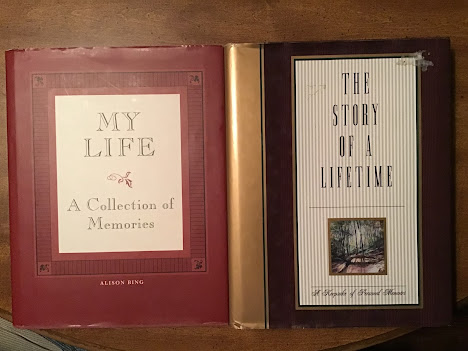Researching Parents and Grandparents
Hello Farmgirl Sisters!
In my last blog entry, I encouraged those who are just
getting started in family research to begin by collecting information and
documentation on themselves. Today I want to talk about moving on to your
parents and grandparents.
If you are fortunate enough to have one or both parents
still living, talk to them and tell them about your interest in documenting the
family tree. Ask them to share copies of their birth certificates and their
marriage license. If one parent is deceased, the other should have a copy of
the death certificate. Once you have those pieces of information, ask your
parents to talk to you about their lives growing up and as a married couple. Make
a file or folder for each parent so you can save their individual documents and
other information.
Trying to get people to remember details about many years of
living can be difficult and a little frustrating sometimes, both for the person
trying to remember those details and for the person trying to record them.
There are a number of different books available I call “life journals”. These
books can be a huge help in collecting family information. They contain dozens
of questions and space to write down answers. These are a couple that I have.
They are older books, but an easy internet search should show you many more to
choose from. I definitely recommend these types of books, especially for
yourself and your parents. They give you the ability to create a very organized
keepsake for yourself and those future generations that will want to know all
about you after you’re gone. I wish all my ancestors had been able to do
something like that. We love to tell stories about our life and times to our
children and grandchildren, but telling those stories doesn’t save them.
Writing them down does.
It’s important to remember that everyone’s family situation
and dynamic is different. Some will have divorced parents, some may have family
estrangements, and others may have lost their parents. There may be bad or sad
memories that people don’t want to recall, traumas they feel are best left in
the past. Respect those feelings and don’t push if someone doesn’t want to
share certain parts of their lives with you. Let them know you will always be
willing to listen if they change their mind.
The basic goal of genealogy is to discover all you can about
your family and ancestors and to document all that information for your future
generations. At the very least, you want to prove the parent-child relationship
from one generation to the next. Even if you aren’t able to collect personal
details about someone, you can still get the Big 3 facts – birth, marriage and
death (if applicable).
Once you’ve gotten as much information about your parents as
you can for now, move on to your grandparents. You’ll need four new folders,
one for each grandparent. If some or all of your grandparents are still living,
they can be a huge help to you with your research. Spend as much time with them
as possible. If they are willing to write in one of those “life journals”, help
them get one and leave it with them to work on at their leisure. They can start
at the beginning of the book, or skip around.
Depending on when and where your grandparents were born,
they may or may not have an official birth certificate. Most people born in the
20th century will have an official birth record in the county or
state where they were born. Ask for copies of those marriage certificates and
if a grandparent is deceased, get a copy of their death certificate.
At this point, you have documented seven different people –
yourself, your two parents, and your four grandparents. You have seven folders,
each with vital records and hopefully, more personal details about each individual.
Now it’s time to start recording all that data in an organized way that you can
apply to each generation as you move back in time. Organization and developing
your own process for recording your family information is one of the most
important things you are going to do. Think about it-you have 2 parents, 4
grandparents, 8 great-grandparents, 16 great, great-grandparents…..Your project
can get bogged down in a hurry if you don’t have a research plan you can stick
to for each person you are seeking information about.
The first three generations – you, your parents, and your
grandparents will, in most cases, be the easiest to establish. Get as much
information as you can about them.
My next post will be “Organizing Your Information”.
Until then, Love, Live and Laugh Each Day to the Fullest!



Comments
Post a Comment